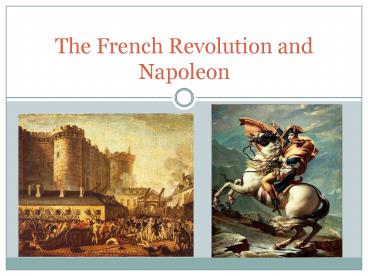The French Revolution and Napoleon - PowerPoint PPT Presentation
Title:
The French Revolution and Napoleon
Description:
The French Revolution and Napoleon I. Beginning of Revolution Throughout the Middle Ages, people of France divided into three estates, or social classes First estate ... – PowerPoint PPT presentation
Number of Views:179
Avg rating:3.0/5.0
Title: The French Revolution and Napoleon
1
The French Revolution and Napoleon
2
I. Beginning of Revolution
- Throughout the Middle Ages, people of France
divided into three estates, or social classes - First estate clergy, owned 10 of land, paid
very few taxes - Second estate nobles, owned 20 of land, paid
almost no taxes - Third estate everyone else, broken into three
groups - Bourgeoisie bankers, business owners, merchants
paid high taxes - Urban workers low wages, high taxes
- Peasants half of income paid to various taxes
- The King oversaw/controlled everything
- Enlightenment ideas forced change
- Scholars called for changes in government,
religion, economy - Rousseau, Voltaire fathers of French Revolution
3
I. continued
CHALLENGE QUESTION!
- Economic problems further ideas of revolution
- High taxes no profits for middle class
- Crop failures food shortages, high prices for
peasant class - Louis XVI and Marie Antoinette were big spenders
- France was deep in debt
- Third Estate revolts
- Began at meeting of Estates-General assembly
of Estate representatives - 3rd Estate called for reform, end of absolute
monarchy - Formed National Assembly, pledged Tennis Court
Oath draw up new constitution, limit power of
monarchy - Storming of Bastille (July 14, 1789) signified
beginning of Revolution
4
I. continued
- Great Fear
- Peasants afraid of retaliation by king and nobles
- Stormed/destroyed nobles homes
- Riots over price of bread
5
II. Revolution In Full Force
- Declaration of the Rights of Man
- men are born and remain free and equal in
rights - liberty, property, security, and resistance to
oppression - Revolutionary ideas did not apply to women
- Reforms
- Catholic church under state control
- Devout Catholic peasants opposed these reforms
- New Constitution
- Limited power of king
- Created new legislative body Legislative
Assembly - Create laws, approve war
- Disagreements created factions, disorganization
6
II. Continued
- Reign of Terror
- Maximilien Robespierre slowly gained control in
chaos following fall of monarchy, war with
Prussia - Set out to erase traces of Frances medieval past
- Closed all churches in Paris, remade calendar (no
Sundays) - Period of rule called Reign of Terror
- Eliminated all enemies of terror
- Extensive use of the guillotine 40,000 people
executed - peasants, nobles, clergy alike
- Was beheaded in 1794 after members of own
government feared for their lives
7
EXIT TICKET!
- Answer the following questions, using complete
sentences - What were the three estates in France during the
Middle Ages? Describe them. - Why were people upset in France right before the
Revolution? Describe two reasons. - What reforms took place after the Revolution?
Describe two examples.
8
III. Rise and Fall of Napoleon I
- Napoleon Bonaparte brilliant military leader,
rose quickly up the ranks - Led French forces during war with Prussia
- Seized power during period of uncertainty in
French government, after Reign of Terror ended - Coup d'état blow to the state, suddenly
seized government through military - People of France were desperate for leadership
- Voted overwhelmingly to give all power to
Napoleon - Kept many revolutionary reforms, while creating
powerful, authoritative government - Promoted law and order, but allowed religious
freedom, more social equality - Established extensive higher education system to
train officials
9
III. Continued
- Power hungry
- Crowned himself Holy Roman Emperor
- Sought to unite Europe under hisleadership
- Battle of Waterloo (1815)
- After his initial defeat and return, British and
Prussian forces ended Napoleons reign for good - Died in exile, on the island of Corsica, in 1821
10
IV. Fallout of French Revolution Napoleon
- Congress of Vienna
- Members of other European nations gathered to
discuss aftermath of Napoleon and restoring
balance of power - A king (Louis XVIII) was placed in charge of
France - France lost most of its international power,
while Britains increased - Rise of political factions conservatives (old
ways), liberals (some changes), radicals (ALL THE
CHANGES!) - Nationalism spreads
- Ideas of nationalism (having great pride in ones
own nation, based on shared culture, race,
ethnicity) spread throughout Europe - Societies united in defense against Napoleon
- Laid foundations for other revolutions and
reforms throughout Europe, later world
11
EXIT TICKET!
- Answer the following questions using complete
sentences - How did Napoleon take control of France?
- Describe one change that took place under
Napoleons leadership. - What was one impact of the Congress of Vienna?
- What is nationalism?
12
CHALLENGE QUESTION!
- Answer the following question, using complete
sentences - What would make you start a revolution? Describe
3-4 things that you think are serious/important
enough to rise up and call for change.
BACK































